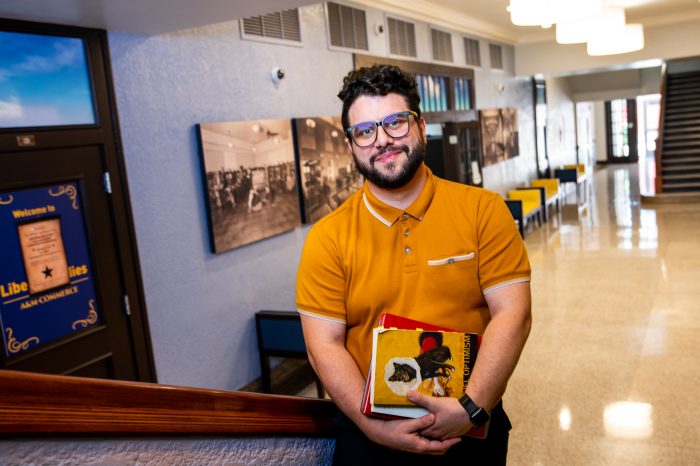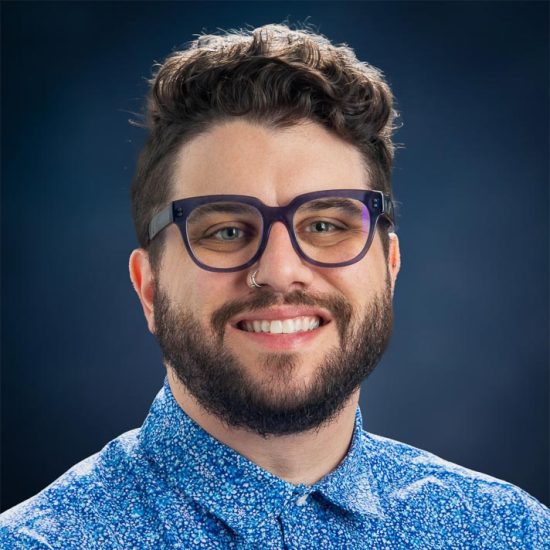
If teachers trust students to engage in difficult, rigorous and rewarding work, together we invent possibilities.
Gavin P. Johnson, Ph.D. Director of Writing and Assistant Professor
- Faculty

Dr. Gavin P. Johnson (he/him) investigates the intersections between rhetorical education, surveillance, writing cultures and digital technologies. His research uses theories of queer worldmaking and critical pedagogy to challenge oppressive structures within and beyond the classroom while imagining possibilities for lives oriented toward communal joy. In his courses, he strives to build student-led learning coalitions across difference to facilitate knowledge-making, persuasive writing, and collective action.
A Conversation with Dr. Gavin Johnson
Why do you like teaching?
I enjoy teaching because it offers students and me opportunities to be curious, investigate complex issues and compose possibilities. I see education as a knowledge-making endeavor that helps us understand who we are and how we might move through the world in relation with others. My job, as a teacher, is to help build spaces for students to ask tough questions, grapple with complex content and think critically about how they can compose change in their professional, personal and political communities. My teaching philosophy boils down to this: If teachers trust students to engage in difficult, rigorous, and rewarding work, together we invent possibilities.
What is your favorite course to teach?
I love teaching courses that focus on digital and multimodal composing. For example, at my previous institutions, I've taught courses on “Mobile Technologies as Rhetorical Technologies” in which students and I investigate how mobile tech like smartphones and wearable devices impact how we interface with and move through the world. In courses like that, we don't just learn about the technology but also use it to propose user-centered interfaces for mobile apps designed to provoke social action on local issues. I jokingly call it the “Playing with Your Phone Class,” but we use the technologies in our pockets to do some difficult (but exciting) learning. I'm hoping to bring that course to East Texas A&M soon!
What do you like most about your career?
Pursuing a career as a professor and scholar means I get to be endlessly curious and have conversations with smart, varied groups of people about my curiosities. I've always been someone who wanted to know more about the world and growing up in the “digital age” gave me access to lots of information but also lots of people. As I learned more about the world through connections with people who are different from me and have other orientations to the world, I began recognizing how power circulates in institutions (like universities) and started questioning how we might use rhetoric, writing, and technology to build new worlds that are more just. Teaching and producing scholarship as a professor allow me to constantly ask, “Why?” and push toward the many different answers out there.
What is a current project?
Currently, I have two book projects in development. The first is a monograph focusing on the concept of “accountability” as it creates and is created by technologies of academic surveillance. The second is a born-digital edited collection co-edited with Dr. Ashanka Kumari and Dr. Shane Wood (U. of Central Florida) tentatively titled Made Not Only in Grades: Multimodal Assessment in the Social Justice Turn. An ongoing project that I'm particularly proud of is the Digital Rhetoric Privacy Collective (DRPC). The DRPC is an interactive, coalitional resource which features activities, assignments, lesson plans, and other teaching materials for teaching about digital privacy and surveillance in writing classrooms. I'm a part of the Advisory Board with Dr. Charles Woods (East Texas A&M), Morgan Banville (Massachusetts Maritime Academy), Cecilia Shelton (U. of Maryland-College Park), Dr. Chen Chen (Utah State U.) and Dr. Noah Wason (SUNY Cortland). We are currently planning a number of initiatives, some of which Dr. Charles Woods and I hope to bring to the East Texas A&M campus!
Education
- Ph.D., Rhetoric, Composition and Literacy, The Ohio State University, 2020
- M.A., Rhetoric and Composition, North Carolina University, 2015
- B.A., English Language and Literature, Nicholls State University, 2013
Experience
- Assistant Professor, East Texas A&M University, 2022-Present
- Assistant Professor, Christian Brothers University, 2020-2022
- Administrative Associate for Second Year Writing, The Ohio State University, 2017-2020
- Graduate Teaching Associate & Instructor of Record, The Ohio State University, 2015-2020
- Associate Director of Digital Media and Composition Institute (DMAC), The Ohio State University, 2017-2019
Teaching Areas
- Rhetoric & Composition
- Digital Media
- Research Methods
Featured Courses
- ENG 333: Honors Advanced Writing (Non-fiction)
- ENG 776: Methods and Methodologies in Writing Studies
- ENG 680: Composition Studies
- ENG 513: Composing in the 21st Century
- AI 510: Seminar in AI Ethics
Research Areas
- Multimodal Composition
- Queer Rhetorics
- Writing Assessment
- Surveillance Studies
- Critical Digital Pedagogies
- Digital Humanities
National Awards
- 2024 Ellen Nold Outstanding Article in Computers and Composition Studies for “Driving Innovations…” co-written with Laura L. Allen
- 2024 Michelle Kendrick Award for the DRPC (with Charles Woods, Morgan Banville, Chen Chen, Cecilia Shelton, and Noah Wason)
- 2024 John Lovas Award for the DRPC (with Charles Woods, Morgan Banville, Chen Chen, Cecilia Shelton, and Noah Wason)
- 2023 College Readiness and Success Models (CRSM) with Pamela Webster (PI). Texas Higher Education Coordinating Board. [awarded: $100,000].
- 2023 CCCC Emerging Researcher Grant (with Charles Woods, Morgan Banville, Chen Chen, Cecilia Shelton, and Noah Wason)
- 2021 NCTE/CCCC Lavender Rhetorics Dissertation Award for Excellence in Queer Scholarship: https://cccc.ncte.org/cccc/awards/lavender
- 2020 Honorable Mention, Computers and Composition Hugh Burns Best Dissertation Award: http://candcblog.org/computersandcomposition/html/awards.htm
- 2019 Kairos Service Award as part of the startup team for nextGen: An International Listserv for Rhetoric and Writing Graduate Students: https://kairos.technorhetoric.net/awards/pastwinners.html#grad
Recent Publications
- Woods, Charles and Gavin P. Johnson. (2024). (Re)designing privacy literacies: Toward post-surveillance in the age of generative AI. Communication Design Quarterly, 12(2), 86-97.
- Johnson, Gavin P. (2024). Assessment's affective attachments. In Kristin DeMint Bailey and Asao B. Inoue (Eds.), Narratives of Joy and Failure in Antiracist Assessment: Exploring Collaborative Writing Assessments (pp. 159-175). The WAC Clearinghouse/University Press of Colorado. https://wac.colostate.edu/docs/books/narratives/chapter9.pdf
- Allen, Laura L., and Gavin P. Johnson. (2023). Driving innovation: Analyzing mobile ridesharing app interfaces and moving toward community-based user experience (CBX). Technical Communication special issue on Critical Digital Interface Analysis and Social Justice 70(4), 27-41. *Awarded the 2024 Ellen Nold Award*
- Johnson, Gavin P. (2023). Don't act like you forgot: Approaching the AI “literacy crisis” with what we know about writing with and through technologies. Composition Studies 51(1), 169-175. https://compositionstudiesjournal.files.wordpress.com/2023/06/johnson.pdf
- Johnson, Gavin P. (2022). “(Queer) Optimism Ain't (Im)Possible.” In Jacqueline Rhodes and Jonathan Alexander (Eds), The Routledge Handbook of Queer Rhetorics (pp. 421-428). Routledge.
- Blancato, Michael, Gavin P. Johnson, Beverly J. Moss, and Sara Wilder. (2022). “Brokering Community-Engaged Writing Pedagogies: Instructors Imagining and Negotiating Race, Space, and Literacy.” Literacy in Composition Studies 9(1), pp. 23-46. https://licsjournal.org/index.php/LiCS/article/view/884
- Baniya, Sweta, Sara Doan, Gavin P. Johnson, Ashanka Kumari, and Virginia M. Schwarz. (2021). “Coalitional literacies of Safety and Solidarity: A White Paper for nextGEN International Listserv.” Computers and Composition, 62. https://doi.org/10.1016/j.compcom.2021.102681
- Johnson, Gavin P., Melissa Guadrón, Kiera M. Hambrick, Yanar Hashlamon, Addison Koneval, and Christa Teston. (2021). “Responding to the Investigative Pivots of Rhetoric Research.” Rhetoric Society Quarterly 51(5), pp. 407-442. https://doi.org/10.1080/02773945.2021.1972130
Teaching And Research Interests
Cultural rhetorics, digital rhetoric, first-year writing
Related News

A&M-Commerce Awards First Annual Innovations in Writing Pedagogy GAT Award
Four A&M-Commerce doctoral students received the Innovations in Writing Pedagogy GAT Award from the Department...


